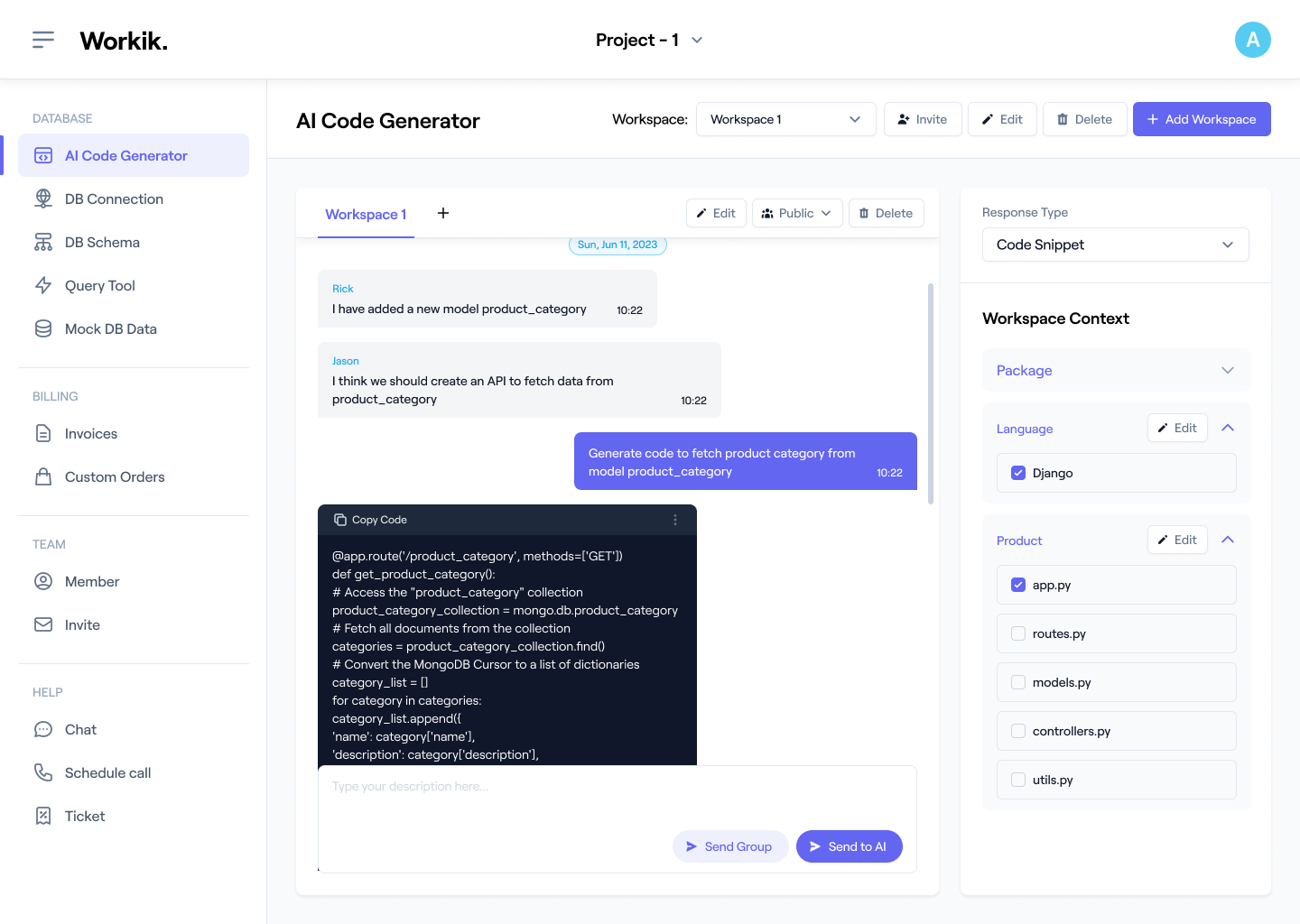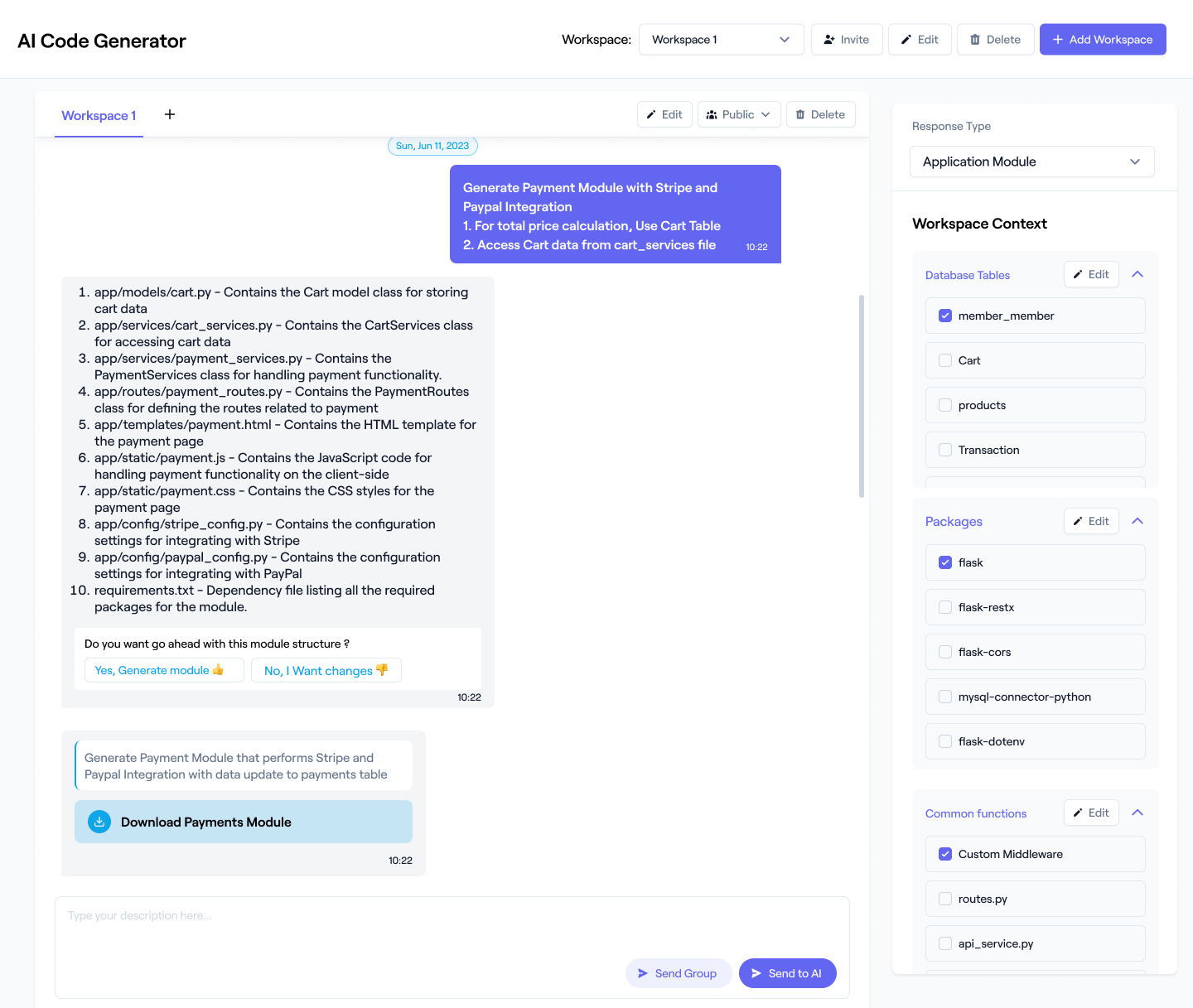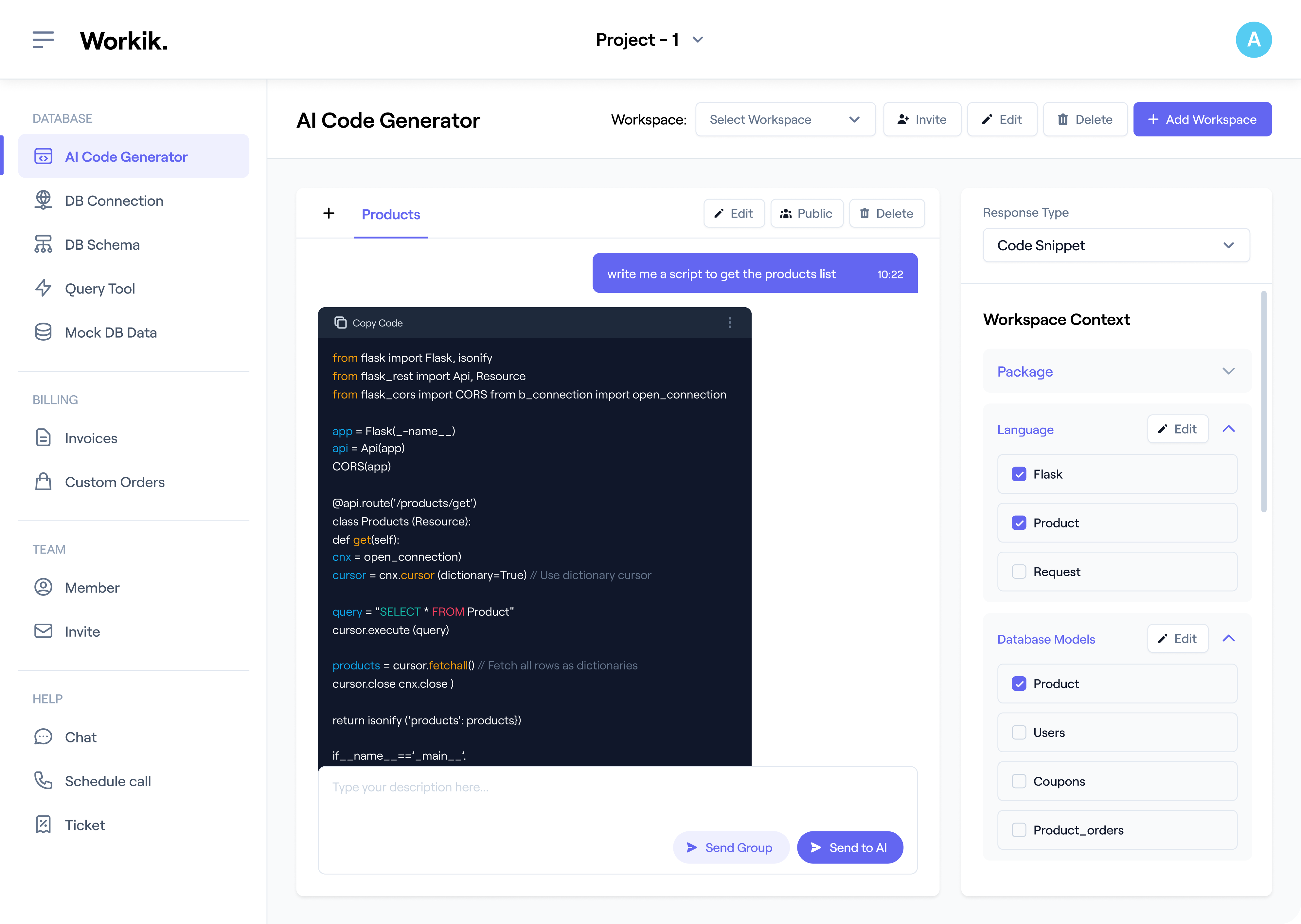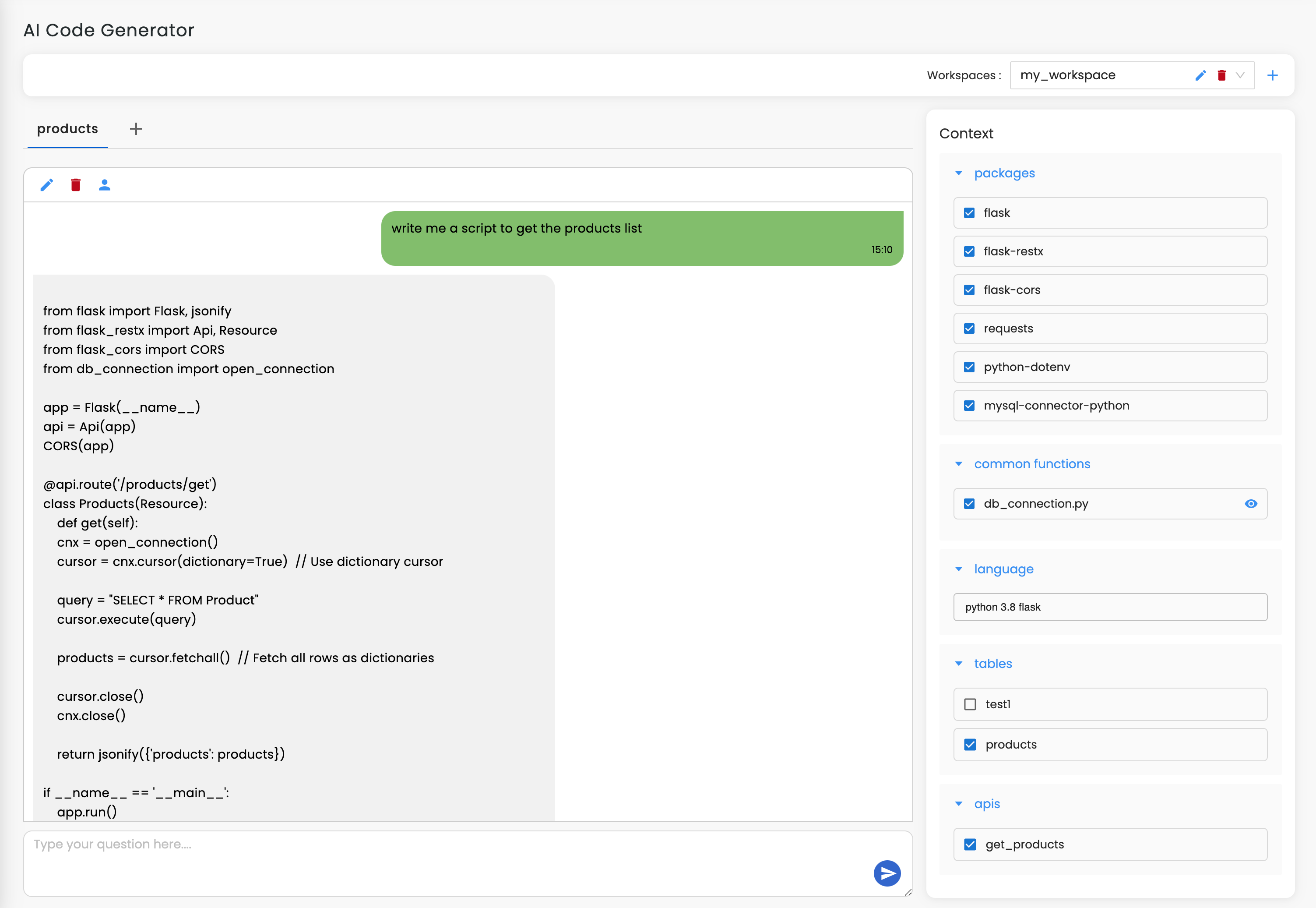
Join our community to see how developers are using Workik AI everyday.
Features

Generate Code Instantly
AI swiftly generates Azure Functions code for triggers like HTTP, Blob Storage, & more in your preferred language (C#, Python, Node.js).

Simplify Trigger Integration
Effortlessly integrate Azure Functions with popular triggers like Blob Storage, Event Grid, Service Bus & more, all with AI assistance.

Streamline API Configuration
Create, configure, and deploy robust APIs using Azure Functions with AI handling routing, errors, bindings and more.

Simplify Binding Setup
Let AI handle complex binding setups for databases, queues, and cloud storage, automating Azure Function input/output connections.
How it works
Sign up for a free Workik account and access AI-driven tools for developing and managing Azure Functions instantly.
Configure your environment by linking GitHub, GitLab, or Bitbucket repositories. Add contexts such as triggers, languages, and relevant Azure services for precise AI-driven function generation.
Use AI for function code generation, trigger setup, binding configurations, and other essential Azure Functions tasks. AI tailors its assistance based on your specific requirements.
Invite your team to collaborate within Workik. Share and review Azure Functions code, test triggers, and deploy effortlessly to the Azure cloud with AI assistance.


Expand


Expand


Expand


Expand


Expand


Expand


Expand


TESTIMONIALS
Real Stories, Real Results with Workik
Workik made scaling our Azure Functions effortless. The AI-generated code for HTTP triggers was spot on!

Jennifer Lee
Senior Cloud Engineer
As a junior, automating Azure Functions workflows felt overwhelming. Workik made it simple.

Sienna Lawn
Junior Developer
Workik streamlined our Azure serverless APIs. Fast, efficient, and great for microservices.

Logan Vans
DevOps Engineer
What are some popular use cases of Workik’s AI for Azure Functions Code Generator?


Some popular use cases of Workik's AI-powered Azure Functions Code Generator for developers include but are not limited to:
* Automate code generation for HTTP triggers, Timer triggers, and Event-driven workflows.
* Seamlessly create and deploy serverless APIs with automatic routing and binding setup.
* Process Blob Storage events for data ingestion or cleanup tasks.
* Set up scheduled functions for tasks like automated backups or data processing.
* Enable real-time notifications through integrations with Azure SignalR or Twilio.
* Automate data transformation by processing events from Event Hub or Service Bus for analytics or logging.
What are the context-setting options for Workik AI for Azure Functions?


Workik offers diverse context-setting options for Azure function code assistance by allowing users to:
* Connect GitHub, GitLab, or Bitbucket to import your existing codebase.
* Set up triggers like HTTP, Blob Storage, Event Grid, or Timer.
* Specify languages like C#, Python, Node.js, or Java for code generation.
* Configure input/output bindings with Azure services like Cosmos DB, Service Bus, or Queue Storage.
* Set scaling configurations for dynamic workloads in Azure Functions.
How does Workik simplify API creation with Azure Functions?


Workik’s AI automates the creation of HTTP-triggered APIs in Azure Functions, handling route configurations, authentication setups using Azure AD, and binding for Cosmos DB or SQL Database connections.
How does Workik assist in managing bindings for Azure Functions?


Workik’s AI automatically configures input/output bindings for Azure Functions, streamlining the integration with services like Azure Queue Storage, Table Storage, or SignalR for real-time communication.
How can Workik’s AI assist with scaling Azure Functions?


Workik’s AI can help configure auto-scaling rules for Azure Functions, ensuring your serverless applications scale efficiently based on traffic demand, resource consumption, or event triggers like Event Hub or Blob Storage.
Generate Code For Free

Azure Functions: Question and Answer
Azure Functions is a serverless compute service that lets developers run code in response to events without managing infrastructure. It handles scaling, execution, and server provisioning, allowing developers to focus on writing logic. Triggers include HTTP requests, timers, and messages from services like Blob Storage, Event Grid, and Service Bus.
Popular languages, frameworks, and tools used with Azure Functions include:
Languages:
C#, Python, Node.js, Java, PowerShell
Frameworks:
.NET Core, Flask, Express, Spring Boot
CI/CD:
Azure DevOps, GitHub Actions, Jenkins
Monitoring:
Azure Monitor, Application Insights
Triggers/Bindings:
HTTP, Blob Storage, Event Grid, Service Bus
Security:
Azure AD, Managed Identities, Key Vault
Popular use cases of Azure Functions include but are not limited to:
Event-Driven Workflows:
Trigger actions based on events like Blob uploads or Service Bus messages.
Serverless APIs:
Create scalable APIs that respond to HTTP requests.
Data Processing:
Process and transform real-time data with Event Hub or Cosmos DB triggers.
Scheduled Tasks:
Automate tasks like backups or report generation with Timer triggers.
IoT Applications:
Handle IoT device data from Azure IoT Hub and send real-time updates.
Microservices:
Build and scale microservices for discrete workloads.
Career roles like Serverless Developer, Cloud Engineer, DevOps Engineer, Solutions Architect, and Azure Developer focus on building and managing serverless apps, event-driven architectures, and Azure cloud integration.
Workik’s AI simplifies Azure Functions development by:
Code Generation:
Instantly creates Azure Functions for HTTP, Blob Storage, and Event Grid triggers.
Debugging:
AI-driven suggestions for fixing code errors.
Testing:
Automates unit testing and monitors performance via Application Insights.
Optimization:
Recommends best practices for scaling and resource management.
Refactoring:
AI suggests code improvements for performance and maintainability.
Documentation:
Automatically generates detailed documentation for your Azure Functions.
Automation:
Configure triggers and bindings with Azure services like Cosmos DB or Service Bus.
CI/CD Integration:
Simplifies deployments with Azure DevOps or GitHub.
Security:
Manages secure access using Azure AD and Key Vault.
Explore more on Workik
Get in touch
Don't miss any updates of our product.
© Workik Inc. 2026 All rights reserved.

